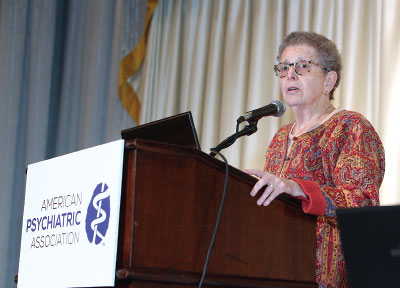Women’s Psychiatry Expert Offers Tips for Addressing Sexual Harassment
Abstract
There are several steps psychiatrists can take to fight sexual harassment, former APA President Nada Stotland, M.D., told IPS attendees.
Asking patients about their history with sexual harassment and abuse should be a routine part of psychiatric care, said former APA President Nada Stotland, M.D., during her presentation at this year’s IPS: The Mental Health Services Conference. These comments were part of a wide-ranging lecture about societal issues facing women today.

If a psychiatry patient has experienced sexual harassment or abuse, Nada Stotland, M.D., suggested holding off pharmacotherapy until the patient’s feelings of guilt, shame, or anger have been addressed.
As the session happened to coincide with the unfolding drama of Brett Kavanaugh’s Supreme Court hearings, the topic of sexual harassment and abuse was particularly relevant, noted Stotland, an expert on reproductive psychiatry and women’s issues. However, even without national news coverage, sexual harassment should be an important issue for mental health professionals, Stotland continued.
She cited a recent analysis conducted by the National Academies of Sciences, Engineering, and Medicine that illuminated the ongoing problem of harassment and gender inequality in medicine. The article cited, for example, that up to 50 percent of women medical students at U.S. institutions have experienced some form of sexual harassment. Put another way, half of women physicians will experience harassment before they even start their careers.
It is a sobering statistic that Stotland said she believes is unlikely to change anytime soon. “We have seen some powerful men get exposed and punished,” she said. “But there have been no significant changes to the governance of institutions [as a whole] that suggest this behavior will be eliminated.”
There are several steps women in medicine can take to protect against sexual harassment, she said.
“Before accepting any job, get as much information as possible about the power structure of the employer and its sexual harassment history,” she advised. Additionally, women should be aware of what support services are available at the institution or in the surrounding area should any problems arise.
Institutional support may not always be available, so women should develop a peer-support network as well, she continued. A peer network can be valuable for disseminating information on potential harassers.
Beyond their own environs, psychiatrists play a key role in helping other people deal with and recover from their experiences of sexual harassment and/or sexual abuse, Stotland continued. Psychiatrists should therefore consider making questions about sexual harassment and/or abuse history a routine part of patient care. “This goes for all patients,” she told Psychiatric News. “Abuse can happen to everyone and anyone.”
Stotland emphasized that psychiatrists should ask questions related to possible harassment and abuse with empathy and sensitivity. If a patient has had such an experience, the psychiatrist’s focus should be on using behavioral techniques to help the patient deal with his or her reactions to the experience, which can include feelings of self-recrimination, shame, guilt, and/or rage.
“You don’t jump in with pharmacotherapy unless a patient has serious symptoms,” Stotland said. “We should not ignore the deeper issues going on in people’s lives while looking for short-term symptom improvement.” ■
The National Academies of Science, Engineering, and Medicine report, titled “Sexual Harassment of Women,” here.



